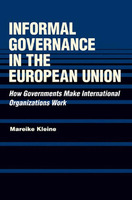Informal Governance in the European Union
How Governments Make International Organizations Work
| dc.contributor.author | Kleine, Mareike | |
| dc.date.accessioned | 2018-01-24 23:55 | |
| dc.date.accessioned | 2017-12-01 23:55:55 | |
| dc.date.accessioned | 2020-03-10 03:00:32 | |
| dc.date.accessioned | 2020-04-01T13:13:17Z | |
| dc.date.available | 2020-04-01T13:13:17Z | |
| dc.date.issued | 2013-09-23 | |
| dc.identifier | 642711 | |
| dc.identifier | OCN: 863593897 | en_US |
| dc.identifier.uri | http://library.oapen.org/handle/20.500.12657/30791 | |
| dc.description.abstract | The European Union is the world’s most advanced international organization, presiding over a level of legal and economic integration unmatched in global politics. To explain this achievement, many observers point to its formal rules that entail strong obligations and delegate substantial power to supranational actors such as the European Commission. This legalistic view, Mareike Kleine contends, is misleading. More often than not, governments and bureaucrats informally depart from the formal rules and thereby contradict their very purpose. Behind the EU’s front of formal rules lies a thick network of informal governance practices. If not the EU’s rules, what accounts for the high level of economic integration among its members? How does the EU really work? In answering these questions, Kleine proposes a new way of thinking about international organizations. | |
| dc.language | English | |
| dc.subject.classification | thema EDItEUR::J Society and Social Sciences::JP Politics and government::JPS International relations::JPSN International institutions | en_US |
| dc.subject.classification | thema EDItEUR::1 Place qualifiers::1Q Other geographical groupings: Oceans and seas, historical, political etc::1QF Political, socio-economic, cultural and strategic groupings::1QFE EU (European Union) | en_US |
| dc.subject.other | Political Science | |
| dc.subject.other | Agenda-setting theory | |
| dc.subject.other | Decision-making | |
| dc.subject.other | European Parliament | |
| dc.subject.other | European Union | |
| dc.subject.other | Member state of the European Union | |
| dc.title | Informal Governance in the European Union | |
| dc.title.alternative | How Governments Make International Organizations Work | |
| dc.type | book | |
| oapen.identifier.doi | 10.7591/cornell/9780801452116.001.0001 | |
| oapen.relation.isPublishedBy | 06a447d4-1d09-460f-8b1d-3b4b09d64407 | |
| oapen.relation.isFundedBy | b818ba9d-2dd9-4fd7-a364-7f305aef7ee9 | |
| oapen.relation.isbn | 9780801469404;9780801469398 | |
| oapen.collection | Knowledge Unlatched (KU) | |
| oapen.place.publication | Ithaca, NY | |
| oapen.grant.number | 101534 | |
| oapen.grant.program | KU Select 2017: Backlist Collection | |
| oapen.remark.public | Relevant Wikipedia pages: Agenda-setting theory - https://en.wikipedia.org/wiki/Agenda-setting_theory; Decision-making - https://en.wikipedia.org/wiki/Decision-making; European Parliament - https://en.wikipedia.org/wiki/European_Parliament; European Union - https://en.wikipedia.org/wiki/European_Union; Member state of the European Union - https://en.wikipedia.org/wiki/Member_state_of_the_European_Union | |
| oapen.identifier.isbn | 9780801452116 | |
| grantor.number | 101534 |

